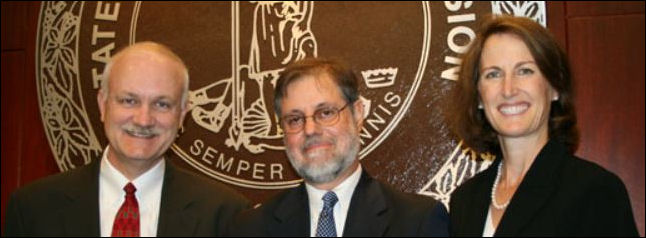by James A. Bacon
The Virginia state Constitution clearly delegates to the State Corporation Commission the power to set electric rates. States Article IX, Section 2: “Subject to such criteria and other requirements as may be prescribed by law, the Commission shall have the power and be charged with the duty of regulating the rates, charges and services … [of] electric companies.”
But legislation enacted in the 2015 session of the General Assembly, with the McAuliffe administration and Republican legislators signing on, froze base electric rates from from mid-2015 through 2022. (Base rates comprise roughly half the electric bill; fuel adjustments and major capital expenditures are not included.)
In effect, the legislature is setting rates, argues James C. Dimitri, one of the SCC’s three commissioners, and the act of freezing the base rates exceeds the General Assembly’s constitutional authority. While neither Dimitri nor the other two commissioners — Mark C. Christie and Judith Williams Jagdmann — spoke out publicly against the legislative deal at the time, Dimitri broke ranks and wrote a dissent in a November SCC ruling directing Dominion to refund $19.7 million to customers.
Under Senate Bill 1349, wrote Dimitri:
Major categories of rising costs can be passed onto customers, but lower costs or savings cannot. That is, for virtually any significant infrastructure or related costs (such as new power plants, demand-side management investment, or transmission lines), separate rate increases are mandated through rider provisions … which effectively guarantee recovery of those costs to the utility, plus a profit and, in some cases, a rate-of-return bonus. Conversely, Senate Bill 1349 fixes base rates (and any excess revenues currently built therein) at existing levels; base rates cannot be lowered by the Commission.
Dimitri’s dissent “revives the debate over Dominion’s exercise in power politics,” wrote Jeff Schapiro, who broke the story in Sunday’s Richmond Times-Dispatch. And it conceivably could propel the issue to the Virginia Supreme Court.
Schapiro quoted the Virginia Committee for Fair Utility Rates in a subsequent SCC pleading: “The constitutional issue raised by the dissent, moreover, has not been addressed by any participant — not by staff, or by any respondent — in this proceeding.”
Dominion justified the rate freeze as a way to ensure rate stability for consumers during a period of tremendous uncertainty about the impact of the Environmental Protection Agency’s Clean Power Plan on Virginia. Last year, SCC staff had estimated that the plan, which would force the shut-down of several coal-fired generators in order to reduce carbon dioxide emissions, could raise electric rates by as much as 20%, although environmentalists suggested that the impact would be much lower.
“Dominion strongly disagrees with any suggestion that the law is unconstitutional,” said spokesman David Botkins. “The SCC order rejecting a request for rehearing on the issue speaks for itself, as does the plain language of the law.”
Bacon’s bottom line: Seems like the operative words in the Constitution are, “Subject to such criteria and other requirements as may be prescribed by law.” In other words, does the Constitution give the General Assembly the authority to set rates when it wants? I’m not a lawyer. I don’t know.



